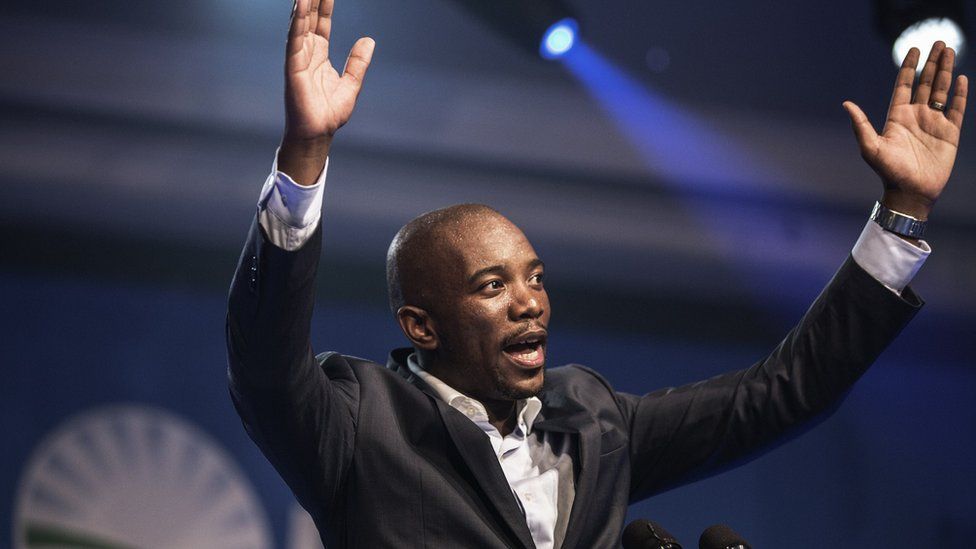Is South Africa's Democratic Alliance serious about tackling racism?
- Published

South African opposition Democratic Alliance (DA) politician Dianne Kohler Barnard has been demoted after sharing a Facebook post which praised apartheid President PW Botha.
She has lost her job as shadow police minister and is now the shadow deputy minister for public works.
But is this demotion enough to limit the damage to the DA's reputation?
The DA has long been seen by many South Africans as a party mainly for white people, and this was the moment for its first black leader Mmusi Mamiane to be assertive.
Some saw his election in May as window-dressing for a party that is nostalgic about the apartheid era, and he has been under pressure to dispel this perception
Mr Maimane's rise to the top job in the DA was precisely because he is black, and his main objective is to grow support for the party among the black electorate.
Ms Kohler Barnard's post could have far-reaching political ramifications.
This could not have come at a worse time for the party, as important local elections, in which the DA hopes to mount a serious challenge to the governing ANC, are just months away.
The shared post which started all the trouble criticised the police and then called for the return of President Botha.
Addressing the deceased apartheid leader it read: "You were far more honest than any of these ANC rogues, and you provided far better services to the public."
Ms Kohler Barnard said she shared the post because of the criticism of the country's corruption-busting police unit in the first sentence, and she did not see the part about Mr Botha.
She has apologised and the post has been removed, and Mr Maimane said it was "indefensible". He later demoted her, but he may need to do more to placate opinion.
Political commentator Justice Malala has written that he should send a message that "racism, and associations with it, will not happen on his watch".
He continues "if Maimane does not do this, he can give wonderful speeches and they will mean nothing".
Many political parties reacted unfavourably to the reshuffle, including the ANC. It said it cannot be fooled by the DA leader's action and it shows it has not shaken off its reputation.
The ANC's Zizi Kodwa said "[if] this was not a party of the past, they would have taken a serious decision, including removing [Ms Kohler Barnard] from parliament".
He told me that this incident reveals that the DA is a racist party which has members who "cannot hide their feelings for PW Botha who caused so much misery. They're praying for him to rise from the grave."
He went on to say that the "DNA of the DA is racist" and that the election of Mr Maimane is just a cover for this.
Those are the words of a politician, but even those who stand back from the fray think that this incident has revealed a bigger problem.
History of incidents
Mcebisi Ndletyana, a senior researcher at the think tank Mapungubwe Institute for Strategic Reflection, said "it is no longer enough for the party to claim it is non-racial".
"By electing Mr Maimane, the party had unsettled the ANC's position that the DA is a racist organisation. But now it will have to start all over again to persuade people who already have doubts, as the doubts are backed by evidence."
Mr Ndletyana reminded me of an incident two months ago in the Nelson Mandela Bay Municipality. There, a DA councillor referred to another councillor, who happened to be black, as a "bobbejaan", Afrikaans for baboon.
Last year, soon after the general election, there was national outrage when DA deputy chief whip Mike Waters tweeted a picture which portrayed ANC voters as dogs. He, too, has since apologised.
And in May this year, at the party's national conference where Mr Maimane was elected, there was a collective cringe when veteran journalist Allister Sparks, expressed his admiration for Hendrik Verwoerd, the architect of apartheid.
He too apologised.
It is clear from the colossal reaction following Ms Kohler Barnard's post that the wounds of apartheid are still raw for millions of South Africans even in a non-racial constitutional democracy.
It is therefore imperative for those who seek to continue with Nelson Mandela's reconciliation project, including Mr Maimane, to be very clear where they stand with racism.
There is no middle ground.
- Published10 May 2015